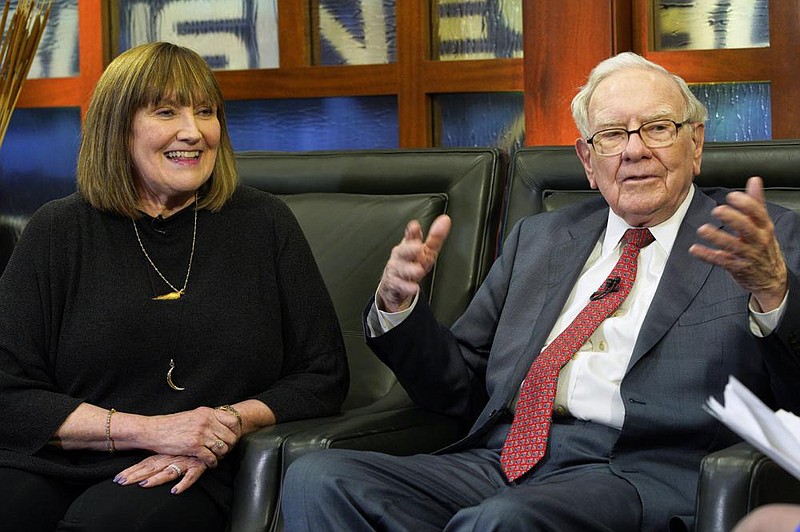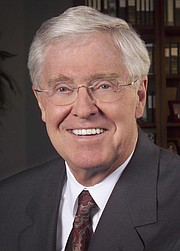In the middle of America, without intention or, really, anyone noticing, a decades-long, real-world experiment shaped by the money, politics and eccentricities of two 80-something billionaires is underway in two equally white, Christian, Republican cities.
Just as they left their imprints on a nation and the world, Charles Koch of Wichita, Kan., and Warren Buffett, a folksy son of Omaha, Neb., have changed the trajectories of their hometowns. Today, their cities, like many scattered across the Plains, are working to reinvent themselves at a time when economies are threatened and a pandemic grows.
A race is on to draw in millennials from overpriced coastal areas to seed a Midwest revival, and the competition for young professionals is fierce. Neither Wichita nor Omaha is an obvious magnet. Both have struggled with brain drain in recent decades. They have lost manufacturing jobs and population growth has slowed.
But both cities are known for one hot commodity: those engaged local billionaires, both of whom consider themselves experts on prosperity.
Koch, 84, is chief executive officer of Koch Industries and is worth an estimated $48 billion. He's a notorious political power broker instrumental in steering the Republican Party toward its current minimalist approach to taxes and government services. Tax cuts coupled with spending cuts, his theory goes, goose the economy and attract jobs.
Buffet, 89, is CEO of Berkshire Hathaway and is giving most of his $72 billion fortune to philanthropic causes. He champions public services -- especially education -- as the rising tide that lifts communities, and he believes that taxing the wealthy is the way to pay for those services.
The influence of these billionaires and their philosophies has been spreading in these cities for decades. Millennials are on the move. Which metropolis will capture their imaginations?
WHAT'S THE MATTER?
Midwesterners take pride in talented offspring -- young professionals with the potential to build businesses -- leaping to larger ponds. But a lot of talent has left Wichita, and the city is struggling.
During the decade ending in 2018, Wichita's job growth declined 3.2%, with stagnant average annual wages, while nationally, employment expanded and wages rose. The city's standard of living rose just 4.6% in that decade, according to the Brookings Institution's Metro Monitor 2020.
For generations, Wichita's economy revolved around homegrown aircraft manufacturers such as Beechcraft, Learjet and Cessna. At the city's zenith in 1980, independent oil producers added to Wichita's swagger. Median household income was 8.4% higher than the national average.
Since then, the city has experienced a long, slow slide. Many aircraft companies moved away or were folded into larger firms. Pizza Hut relocated, and oil and gas production withered. Koch Industries, a chemical and manufacturing conglomerate, remained, a rare heyday holdover that continued to expand.
Wichita's entrepreneurial spirit seemed to vanish with its founding families. The city missed out on booms in technology and financial services. And with the covid-19 outbreak, massive layoffs in the remaining aircraft companies "have left the city in economic limbo," said Jeremy Hill, director of the Wichita State University Center for Economic Development and Business Research.
Back in 2015, the Wichita Community Foundation, a nonprofit supporting charitable local investments, knew the city was in trouble and sought out James Chung, a son of Wichita and founder of Reach Advisors, a New York strategy and predictive analytics company. The foundation had one overarching question: What's the matter with Wichita?
After months of analyzing government data, Chung declared Wichita in "crisis" in a presentation to city leaders. Among his findings: The flow of graduates returning home from the state's universities had slowed to a trickle, and new people were reluctant to move to a place they viewed as insular and intolerant compared with similarly sized Midwestern cities.
Wichita, Chung warned, would simply fade away unless it invested in civic renewal. Wealthy citizens, he said, needed to step up and lead the effort to attract a new generation of innovators, entrepreneurs and investors.
Three years later, when the Community Foundation asked him to gauge the city's progress, Chung reported that Wichita was a "catastrophe." There was still no investment, he said.
How could that be?
Kenneth Kriz, a former WSU professor who studied at the University of Nebraska and is now a professor of public administration at the University of Illinois, offered this insight: "To understand Wichita, look at Omaha."
SECOND ACT
Like Wichita, Omaha flourished after World War II, but in the 1970s it crashed hard. The footprint of two of the city's economic mainstays, meatpacking and food processing, was shrinking. Major corporate headquarters started to relocate.
But some of the big insurance companies stayed and prospered, and a shift to telecom and tech services in the 1990s, combined with the launch of financial innovator TD Ameritrade, gave the city a second act. The success of Kiewit Corp., a locally owned construction and engineering firm with revenue of $9 billion in 2018, and investments in health care and medical research also spurred economic growth.
"Finance and professional services, which typically provide a lot of good jobs, are much bigger sectors in Omaha than Wichita," said Alan Berube, deputy director of the Brookings Institution's Metropolitan Policy Program, which oversees Metro Monitor 2020. Manufacturing accounts for only 8% to 9% of Omaha's gross domestic product, he said; in Wichita, it accounts for one-third of GDP.
Jobs in Omaha grew 6.6% in the decade ending in 2018, with average annual wages rising 8.8%, pushing the standard of living up 10.5%, according to Brookings. While both Omaha and Wichita hovered at around 500,000 residents in 1980, the population of Omaha's metro area now exceeds 975,000. Wichita's is 645,000.
"The general sentiment in Omaha is people feel fortunate to live there," said Chung, who compared the city to Wichita in his study. "Omaha does a great job of investing in itself."
Heritage Services is a case in point. Since 1990, this low-profile Omaha nonprofit, backed by about 100 mostly anonymous residents, has raised $725 million in private donations, which combined with matching public funds has paid for $1.2 billion in projects that include sports fields for public schools, homeless shelters and arts institutions and theaters.
The chairman of Heritage Services is former Kiewit Corp. CEO Walter Scott Jr., 89, an early Berkshire Hathaway investor and board member and informal adviser to Buffett's daughter, Susie Buffett, 66.
Warren Buffett gets credit for a measure of Omaha's wealth; some of his friends and neighbors were early investors in Berkshire Hathaway, a holding company with a diverse portfolio of hundreds of businesses. Although little of his direct philanthropy has been locally focused (Buffett is giving much of his fortune to the Bill & Melinda Gates Foundation), investors in his company became local philanthropists. More important, his bequests to his daughter's Sherwood Foundation have made her a top-tier donor in Omaha. (Warren Buffett declined to be interviewed for this story.)
Susie Buffett has made supporting Omaha's least-advantaged residents her mission, and she started with the city's public schools. If America's powerful families had to put their children in public schools, she likes to say, everyone in the country would get a first-rate education.
Buffett began her philanthropic work in Omaha in 2000, when she opened her first Educare center, an early childhood education program that originated in Chicago. Working in partnership with Omaha Public Schools and others, she has now built two birth-to-kindergarten centers and three infant-toddler centers with no-cost, all-day child care, as well as family counseling, health care and meals.
In the past two decades, Buffett has broadened her support across all of Omaha's public services, giving a total of $1.3 billion to her hometown and state. In addition, through the Susan Thompson Buffett Foundation, honoring her mother's commitment to women's health and education, Buffett annually awards 1,000 need-based full college scholarships to Nebraskans.
Buffett believes in working with public entities and in following their lead. She also believes a community that takes care of its most vulnerable members fosters a better life for everyone.
"We all want to attract new young people to live in Omaha and make the people who grew up here want to stay," she said.
CHARITABLE FUNDING
Wichita has a way to go before it catches up with Omaha's philanthropy, says Nathan Dietz, a senior researcher with the University of Maryland's Do Good Institute and the Urban Institute. While charitable funding has grown at the same pace in the cities in recent years, Omaha had a head start.
Internal Revenue Service data from 2014 show that funding for Omaha's public charities far exceeds Wichita's in nearly every category. For example, arts nonprofits in Omaha took in $361 per capita, compared with $49 in Wichita; Omaha hospitals took in $4,216 per capita, versus $1,413 in Wichita.
Koch is among Wichita's leading philanthropists. The Charles Koch Foundation, other family foundations and Koch Industries, a private corporation, have given a total of $90 million to Kansas-based philanthropies during the past 20 years, said spokesman David Dziok.
While Koch Industries has made its top executives wealthy, unlike Berkshire Hathaway it did not mint a generation of multimillionaires. There's nothing like Heritage Services in Wichita.
Koch's philanthropy reflects his belief in "individual empowerment" and "self-actualization," his spokesman said. The leading beneficiary of Koch's gifts is Wichita State University, which has received $21 million for sports facilities, scholarships and academic programs.
Koch's other local donations include $14.8 million for the Mary R. Koch Arts Center (known as Mark Arts), an institute located on Koch family property, across the street from his home; and $20 million to Youth Entrepreneurs, a high school program available nationally, that Koch and his wife created to teach students "entrepreneurial thinking."
In recent years, Koch has given $360,500 to a Wichita high school program, Rise Up for Youth, serving 600 at-risk teens each year through activities and mentorships stressing self-determination and self-respect.

